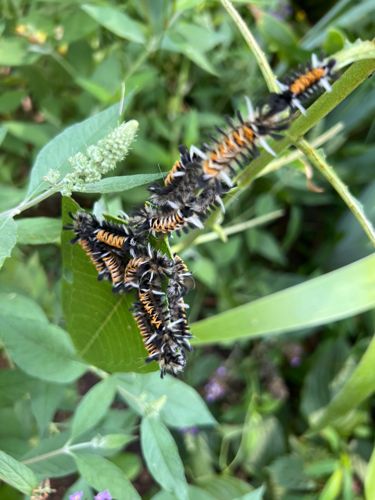Variegated Fritillary Caterpillar
Scientific Name: Euptoieta claudia
Order & Family: Lepidoptera (Order), Nymphalidae (Family)
Size: Caterpillars grow to about 3.5 cm (1.4 inches) in length. Adult butterflies have a wingspan of about 4.5 to 7 cm (1.8 to 2.8 inches).

Natural Habitat
The Variegated Fritillary is common in open, sunny areas such as fields, meadows, pastures, open woodlands, gardens, and urban disturbed areas. They can be found across a wide range of climates.
Diet & Feeding
The primary diet of the larvae (caterpillars) consists of leaves of host plants, including passionflower (Passiflora spp.), violets (Viola spp.), plantain (Plantago spp.), and various other herbaceous plants. Adult butterflies feed on nectar from a variety of flowers.
Behavior Patterns
These caterpillars are gregarious, often found in clusters, especially when young, as seen in the image. They feed voraciously. As they mature, they become more solitary. They undergo complete metamorphosis, forming a chrysalis (pupa) from which the adult butterfly emerges.
Risks & Benefits
Generally beneficial as pollinators in their adult stage. The caterpillars can cause defoliation to host plants, particularly in large numbers, but rarely cause significant harm to agricultural crops. They are an important part of the food web.
Identified on: 8/8/2025